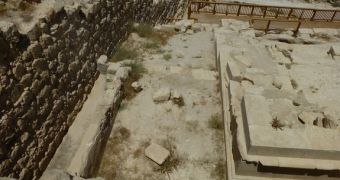Back in 2007, archaeologists proudly announced that they had found Herod the Great's tomb. However, recent evidence indicates that the late king's final resting place is yet to be discovered.
Live Science tells us that what researchers mistook for King Herod's tomb was a mausoleum unearthed in the desert outside Jerusalem.
This mausoleum used to be part and parcel of a larger complex that the late king of Judea, who ruled not long before Jesus' time, is known to have built in this area.
Still, archaeologists speaking at a conference in Jerusalem on October 10 said that, all things considered, this construction was simply too small and too modest to have served as Herod the Great's tomb.
More so given the fact that the late king is known to have been both ostentatious and a skilled planner and builder, the same source details.
Thus, the construction covers a surface of about 32-by-32-foot (10 by 10 meters), and its architecture isn't by all means all that impressive.
“These are quite moderate dimensions if you are thinking about a king of the stature of Herod the Great,” said archaeologist Joseph Patrich with the Hebrew University of Jerusalem.
“There is hardly place for 20 people to stand conveniently, and there is no respectable gateway to lead in,” he went on to argue. Otherwise put, there simply isn't enough space for crowds to have come to pay their respects to the late king, as was the custom.
Besides, the tomb only has one pyramid. By comparison, the tombs of kings in the Hasmonean dynasty, who ruled before Herod the Great, had seven pyramids each.
Lastly, the materials used to make the coffins found inside the mausoleum were limestone and red stone. Given the late king's ostentatious nature, chances are that he would have much preferred to spend eternity in a marble, maybe even gold coffin.
Specialists suspect that the mausoleum was intended to serve as a final resting place for Herod's mother, father, brother or some other close family member.
Future investigations are expected to shed more light on this topic.

 14 DAY TRIAL //
14 DAY TRIAL //